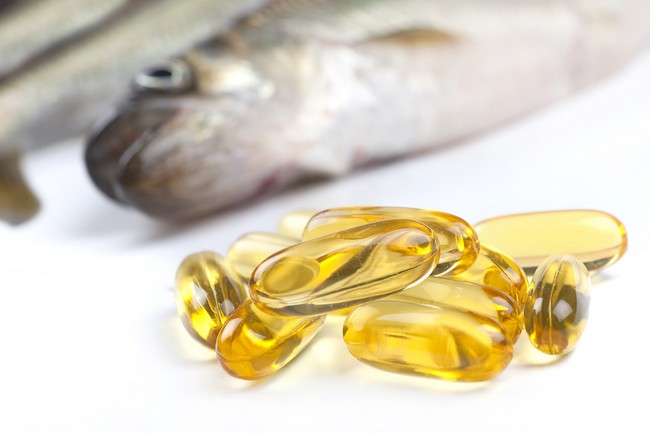- Make It Yourself Lavender Heart-Shaped Bath Bombs!
- 20 Things You Never Knew About “Down There”
- 12 Best Foods For Those Suffering From Arthritis Pain
- 12 Personal Hygiene Mistakes Almost Everyone Makes (Mom Never Told You About #4!)
- 15 Medicinal Plants And Herbs From The Cherokee People
- 12 Mind-Blowing Benefits Of Drinking Coconut Water During Pregnancy
- 12 Outstanding Winter Foods That Won’t Fatten You Up Like A Christmas Turkey
Fish Oil Vs. Krill Oil: Which Is Better For You?

Photo credit: bigstock.com
When you are looking for the best omega-3 supplement, it’s easy to get confused by all the different brands and dosage information out there. Lately, however, something new has come on the horizon that makes matters even more complicated: Krill oil. What exactly is it, and is it better than your regular fish oil supplements? We will clear things up for you so that you can make a more informed choice.
What is krill oil?
Krill oil is extracted from a very tiny, very bottom of the food chain crustacean that lives in the ice cold waters near Antarctica. Krill oil is said to be more nutrient dense than regular fish oil and provide you with the same health benefits that you currently get from fish oil.
The main selling point here is that the omega-3s in krill oil come in a form that is easier for the body to absorb. Krill oil also has another essential nutrient, choline, and antioxidants that fish oil does not have.
How much better does your body absorb krill oil? About 60 percent better. This means fewer capsules need to be taken to get the same health benefits. For example, if you are taking fish oil for your arthritis, it might be between nine and 14 capsules of fish oil a day, where if you were to decide to change to krill oil, you would take only one or two capsules for the same benefits.
Krill oil manufacturers also say that their business is cleaner and safer because it comes from the less contaminated waters around Antarctica. There is also very little, if any, danger of over-harvesting krill as they represent one of the largest biomasses on the planet. If you were to weigh all the krill in the world, it would weight twice as much as the human population.
Unfortunately, due to its location and the process needed to extract krill oil, krill supplements are more expensive than traditional fish oil supplements.
Continue to Page 2

Photo credit: bigstock.com
Isn’t fish oil just as good?
Those who support fish oil say that their product has proven benefits, with thousands of studies to back up its health benefits, and krill oil is still relatively new.
Australians have certainly taken to fish oil supplements, with sales increasing by a whopping 65 percent just in the past seven years.
There is plenty of room in the market for both types of omega-3s: It’s simply a matter of choice and price, according to most researchers. The important thing is to get in your recommended dose of omega-3s from whatever source appeals to you and your pocketbook.
It’s true that there are not nearly as many studies involving krill oil as there are fish oil supplements, but here are a few of the studies that we found:
- Heart health. It is well known that the consumption of omega-3s found in fatty fish or fish oil pill can reduce heart attack risks. A study published in the 2011 issue of the journal Lipids found that you can get the same benefits of fish oil for your heart by taking krill oil supplements. This study involved 113 male and female subjects who underwent testing during a7 week clinical trial. These tests have shown that the blood levels of EPA and DHA got higher just as much in both the fish oil group and the krill oil group when compared to the placebo group. This doesn’t mean that krill oil or fish oil was “better,” but only that both oils were equally beneficial to the body.
- PMS. Studies have shown that krill oil supplements reduced pain and other PMS symptoms much better than fish oil. This study, reported in Alternative Medicine Review issued in May 2003, found that krill oil supplements were more effective in managing self-reported joint pain, mood swings, and breast tenderness,. There did not appear to be any difference between the two supplements when it came to swelling, abdominal pain, bloating, or weight gain.
- Arthritis. Krill oil did seem superior for those who suffer from arthritis by reducing inflammation, pain, and stiffness — that is, according to the clinical trial carried out at the University Health Network in Toronto, Canada. In this study, krill oil was found to reduce pain much better than a placebo and CRP levels fell a whopping 31 percent among those taking the krill oil when compared to the 25 percent rise in the placebo group.
Although there are benefits in both supplements, it does appear that there is a slight edge to krill oil, according to the research we were able to find.
Continue to Page 3

Photo credit: bigstock.com
By the way, you might have also heard that krill oil supplements don’t give you those “fishy burps” in the way some fish oil supplements do. There have been no studies we can find on that issue, but we have heard that when fish supplements are frozen, that they tend to minimize those annoying fishy tasting burps.
Regardless of which supplement you take, one thing that is clear: Animal-based omega-3s’s from either fish oil or krill oil supplements are a much better source of omega-3’s than plant based omega-2’s. Plants contain a substance called ALA, or alpha-linolenic acid. The body must convert these into DHA and EPA, but a maximum of the ALA is actually converted into what the body can use. This is a strong case for supplementing with either fish oil or krill oil supplements.
SEE ALSO: 6 Reasons to Choose Krill Oil See Why Not All Omega-3 Is Created Equal Infographic
Always consult with your doctor before taking any omega-3 supplement, as taking too much can cause serious thinning of the blood. You should never take more than three grams of either fish oil or krill oil each day. Also, if you eat seafood regularly, then you will want to lower your dose of fish or krill oil supplements.
Be careful of buying cheap krill oil supplements. If something sounds too good to be true, it probably is. Always buy your supplements from a reputable source. An average price per pill should be in the area of 30 cents per pill. If you find anything under 20 cents, chances are good that it is either not krill oil, or it is not a good quality supplement.
References:
































